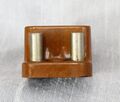505
The General Radio 505 Capacitor was introduced in Catalog G2 (1934) and remained available through Catalog S (1965).
The Type 505 is a secondary capacitance standard using a silvered-mica dielectric. The capacitor is installed in a low-loss phenolic case along with Silica gel desiccant then sealed with wax. The Type 505 has almost as equally high stability as the 1409 Standard Capacitor at one quarter the cost. The Type 505 is found in many General Radio instruments as a capacitance standard. It is supplied in two case sizes, the small and large.
The 505 series of standard capacitors comprises
Specifications
- Accuracy: at 1 kHz, ±0.5% or ±3 pf, whichever is the larger
- Dielectric: Silvered-Mica
- Temperature Coefficient: Approximately +35 ppm per degree Centigrade between 10 and 50 C. Calibration is made at 23 C, at a frequency of 1 kHz
Links
| Type | Capacitance | Dissipation Factor |
Maximum Peak Voltage |
Frequency Limit for Max Volts |
Leakage Resistance |
Code |
|---|---|---|---|---|---|---|
| 505-A | 100 pF | 0.0006 | 700 | 10 MHz | >100,000 MΩ | 0505-9701 |
| 505-B | 200 pF | 0.0004 | 700 | 6 MHz | >100,000 MΩ | 0505-9701 |
| 505-E | 500 pF | 0.00035 | 500 | 4 MHz | >100,000 MΩ | 0505-9705 |
| 505-F | 0.001 μF | 0.0003 | 500 | 2.3 MHz | >100,000 MΩ | 0505-9706 |
| 505-G | 0.002 μF | 0.0003 | 500 | 1.3 MHz | >100,000 MΩ | 0505-9707 |
| 505-K | 0.005 μF | 0.0003 | 500 | 630 kHz | >100,000 MΩ | 0505-9711 |
| 505-L | 0.01 μF | 0.0003 | 500 | 360 kHz | >100,000 MΩ | 0505-9712 |
| 505-M | 0.02 μF | 0.0003 | 500 | 210 kHz | >100,000 MΩ | 0505-9713 |
| #505-Q | 0.05 μF | 0.0003 | 350 | 32 kHz | >100,000 MΩ | CONDENJACK |
| #505-R | 0.05 μF | 0.0003 | 500 | 100 kHz | >100,000 MΩ | 0505-9718 |
| #505-T | 0.1 μF | 0.0003 | 500 | 50 kHz | >50,000 MΩ | 0505-9720 |
| #505-U | 0.2 μF | 0.0003 | 500 | 20 kHz | >25,000 MΩ | 0505-9721 |
| #505-X | 0.5 μF | 0.0003 | 500 | 10 kHz | >10,000 MΩ | 0505-9724 |
- #Mounted in large case.
Photos
Small Case
Large Case











